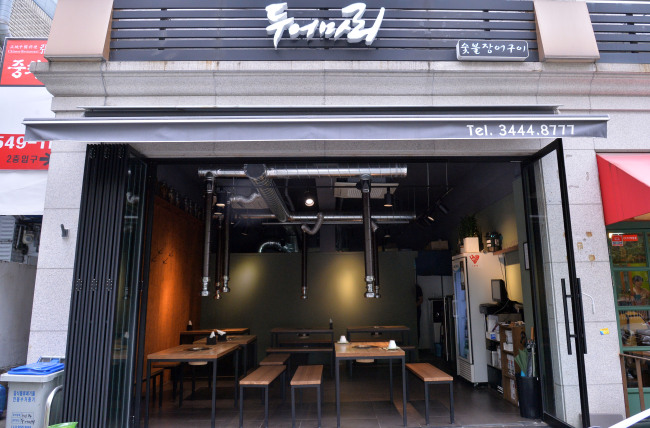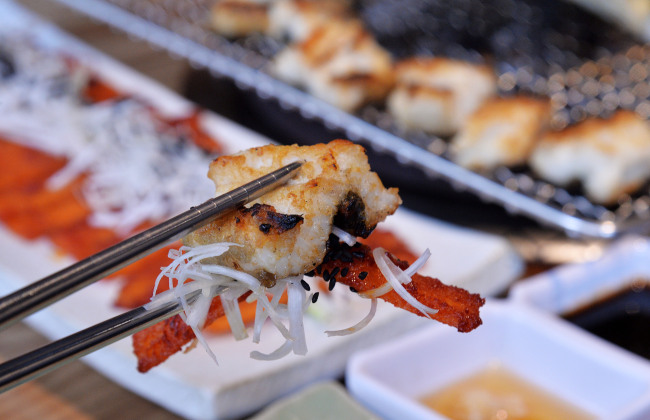Charcoal-grilled saltwater eel at Doo-uh Mari
Summer delicacy served with a twist at Nonhyeon-dong restaurant
By Korea HeraldPublished : Aug. 30, 2015 - 17:26

Eel, long considered a wholesome summer delicacy in Korea, is the main attraction at Doo-uh Mari -- a small, 22-seat eatery that opened last year in Seoul’s Nonhyeon-dong.
“We went to Busan and had saltwater eel,” Doo-uh Mari co-owner Oh Jung-min explained, saying after he and his friend tasted marine eel, a popular dish in Busan, the duo decided it would be a good idea to focus on saltwater eel for their new restaurant.
Unlike freshwater eel, says Oh, saltwater eel tend to be “less oily” and therefore sport a “light” flavor profile.
To heighten the natural flavors of the fish, the saltwater eel at Doo-uh Mari is grilled, sans sauce, to crisp and plump perfection, until the snow white flesh is soft, flaky and almost steak-like in texture.
It is that sort of meaty heft that Oh and team are keen on emphasizing at their spot.

“We try to source thick and large eels, because if the eels are not thick enough it burns quickly when grilled and you cannot achieve that ideal texture,” said Oh, 31.
Oh explained how he and his team finish the eel on a charcoal grill at the table, skin side down first, to save customers the hassle of having to grill the fish themselves, and to also make sure the eel is served just right -- sizzling hot, crisp on the outside and soft on the inside.
On any given day, Oh stokes a grill fired by white binchotan charcoal sourced from Vietnam -- for a “pleasant aroma” -- before barbecuing eel tableside, expertly moving the finished hunks of fish to the side of the grill so that customers can pick up each piping hot morsel and dunk it into one of two sauces -- a simple salt, garlic and sesame seed oil concoction or a sweet homemade soy-based condiment flavored with “maesil” (Chinese plum).
While the eel is great solo, sauced-up or wrapped in fragrant perilla leaves and garnished with slivers of fresh ginger, it is also wonderful swaddled in grilled “deodeok” (Codonopsis lanceolata root).
A wholesome vegetable dish, the fragrant, slightly resinous fragrance of the meat-like root and the sweet fire of the sauce with a “gochujang” (red pepper paste) base slathered over it acts as a tasty foil to the natural richness of the eel.
After wrapping a morsel of grilled eel in deodeok, Oh recommends dipping the whole thing into the sesame sauce, imparting an extra layer of nuttiness to that bite-sized bundle of fish and root.
“When we were looking into opening a restaurant, we looked into ‘deodeok,’” Oh said, “We then discovered that it worked well with eel.”
This not-so-traditional combination of two health foods reflects the overall aesthetic of Doo-uh Mari, which offers both red and white wine, neither traditionally paired with grilled eel in Korea, as options on the drinks menu.
Doo-uh Mari’s owners even invite customers to bring their own wine, offering free corkage for the first bottle.
“We wanted our place to be hip and not run-of-the-mill,” said Oh, adding the intention was to make their spot versatile as well, a place where one could bring a date, enjoy a business dinner or gather with friends or family.
To that end, the owners of Doo-uh Mari dreamed up a minimal space with a smattering of wood tables and wood seating, with tall, floor-length windows that can be opened all the way, to create an intimate and relaxed al fresco dining experience.
That sense of warmth, due, in part, to the friendly service, has helped shape the restaurant, Oh revealed, with feedback from patrons playing a key role in even the most minute details, from the dipping sauce down to the rice and the fermented hairtail innards paste that is served at the beginning of the meal.

Doo-uh Mari
98-10 Nonhyeon-dong, Gangnam-gu, Seoul
(02) 3444-8777
Open 11:30 a.m. to 2 p.m. and 6 p.m. to midnight from Mondays to Fridays, from 6 p.m. to midnight Saturdays, closed Sundays
Grilled eel costs 22,000 won ($18.70) for 170 grams, grilled deodeok costs 18,000 won, drinks (including wine by the bottle) cost 2,000 won to 110,000 won
Eel not available during lunch hours unless reserved in advance
By Jean Oh
(oh_jean@heraldcorp.com)
-
Articles by Korea Herald









![[Today’s K-pop] BTS pop-up event to come to Seoul](http://res.heraldm.com/phpwas/restmb_idxmake.php?idx=644&simg=/content/image/2024/04/17/20240417050734_0.jpg&u=)

![[Graphic News] More Koreans say they plan long-distance trips this year](http://res.heraldm.com/phpwas/restmb_idxmake.php?idx=644&simg=/content/image/2024/04/17/20240417050828_0.gif&u=)






![[KH Explains] Hyundai's full hybrid edge to pay off amid slow transition to pure EVs](http://res.heraldm.com/phpwas/restmb_idxmake.php?idx=652&simg=/content/image/2024/04/18/20240418050645_0.jpg&u=20240419100350)

